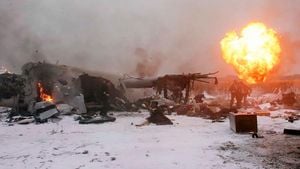On February 9, 2025, Estonian President Alar Karis made headlines with his emphatic call for the European Union to reassess its energy ties with Russia. "European Union should boost independence even more and end all Russian energy imports to the EU," Karis declared via social media. This statement was anchored by the recent strategic move where the Baltic states, including Estonia, Latvia, and Lithuania, disconnected their energy systems from Russia's power grid, marking a historic shift away from Russian energy dependence.
This groundbreaking decision reflects the increasing urgency among European nations to sever ties with Russian energy suppliers, especially since the full-scale invasion of Ukraine by Russia began. The devastating effects of this war have sent ripples across Europe, leading to drastic measures to reduce reliance on Russian fossil fuels. The European Union's ambitious plan aims to cut all Russian coal imports, most oil imports, and over two-thirds of gas imports by 2027, signaling their serious commitment to diminishing Russia's ability to fund its military ventures.
Earlier this year, EU officials reiterated this commitment, stressing the importance of fostering energy independence. Estonia, having long been one of Ukraine's staunchest supporters amid the conflict, has taken its stance even more seriously. Aside from pledging military and humanitarian assistance, Estonia has been vocal about the need for harsher sanctions against Russia, which includes advocating for complete economic isolation.
Adding to Estonia's proactive measure is its financial support directed toward helping Ukraine with its resilience and recovery. On February 12, 2025, Estonia's government signed an agreement to contribute €10,000 to the Council of Europe Action Plan for Ukraine. This agreement was officially signed by Ambassador Aino Leppik von Wirén, the Permanent Representative of Estonia to the Council of Europe, solidifying Estonia's commitment to aiding Ukraine’s recovery efforts.
Yet, the geopolitical tensions extend beyond energy. A recent annual national security report from Estonia has raised alarms over China's role as a key hub for smuggling arms to Russia. According to Kaupo Rosin, the director general of the Estonian security services, "Chinese interests here lie in preventing Russia from losing the war in Ukraine as such an outcome would represent a victory for the United States, which is the main rival for China." This statement highlights the entangled interests of major powers amid the Ukraine conflict.
The report emphasized the impact of Chinese exports on Russia’s drone production, noting about 80% of components reaching Russia now originate from China. This cooperation poses significant security challenges to Estonia and its Baltic neighbors. Once renowned for their strategic defense against Russian aggression during the Cold War, Estonia, Latvia, and Lithuania remain vigilant as they assess their defense strategies against potential threats.
Vigorously monitoring the situation, Estonian officials noted the implication of Chinese arms shipments providing Russia with dual-use technologies needed for warfare. This reinforces the need for Estonia to remain not only economically separated from Russia but also proactive on the intelligence front, ensuring it can effectively counter any military threats.
Despite the reassurance provided by Chinese diplomats, who denied allegations of arms smuggling to Russia as being part of "a coordinated and deliberate smear campaign against China," the concerns remain heightened. The Chinese spokesperson stated, "China never provides weapons to the parties to the crisis and strictly controls the export of dual-use articles," emphasizing the stringent measures on exports. Nonetheless, Estonian intelligence remains skeptical, believing deep cooperative ties still exist.
Estonia’s advocacy for energy independence coupled with its humanitarian efforts exemplifies its commitment to supporting Ukraine and safeguarding its own sovereignty. The geopolitical climate remains tense, with Russia aggressively pursuing military enhancements as it foresees its personnel numbers swelling from 600,000 to 1.5 million. These expansions are geared toward entrenching Russia's presence along NATO’s Eastern borders, including the Baltic states.
The shifting dynamics exemplified by Estonia's decisions highlight the broader ideological battle where nations align themselves, asserting independence from traditional power structures, thereby paving pathways toward new collaborative energies amid global tensions.
Through the lens of Estonia’s response to the Russia-Ukraine war, it becomes increasingly evident just how intertwined energy politics and military strategies have become, as countries navigate their roles amid these historical upheavals.



